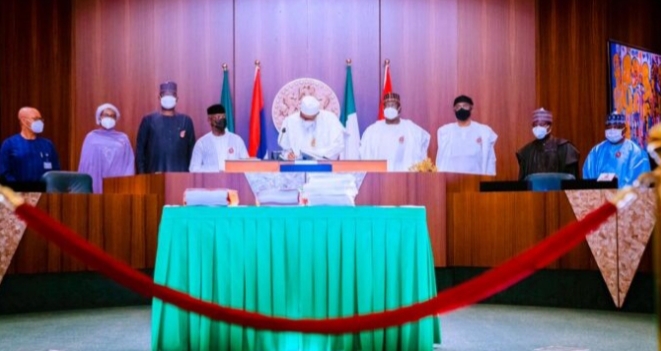A civic-tech non-profit organisation, BudgIT has stated that it has uncovered 316 duplicated capital projects worth N39.5 billion in the 2021 budget.
This was contained in a statement released by Iyanu Fatoba, communications associate at BudgIT.
According to the statemen the organisation’s findings is contained in its publication titled, “Demanding Budget Reforms for Resource Optimization”, released on Tuesday.
Recall that President Muhammadu Buhari on December 31 signed the 2021 appropriation bill of N13.588 trillion into law.
The signing was done more than a week after federal lawmakers passed the budget and raised its total sum by N508 billion.
Speaking on the report, Gabriel Okeowo, BudgIT’s CEO, said out of the identified 316 duplicated projects, 115 are in the ministry of health.
He said the development is “very disturbing” as the country is battling a deficit in health infrastructure across the 36 states.
Okeowo added the some ministries also received approvals for projects outside the scope of their mandate.
“Our investigations into the 2021 budget revealed at least 316 duplicated capital projects worth N39.5bn, with 115 of those duplicate projects occurring in the Ministry of Health. This is very disturbing especially considering the health infrastructure deficit and the raging COVID-19 pandemic affecting Nigeria,” he said.
“Even worse, agencies now receive allocations for capital projects they cannot execute. For example, the National Agriculture Seed Council has an allocation for N400m to construct solar street lights across all six geopolitical zones, while the Federal College of Forestry in lbadan in Oyo State got N50m for the construction of street lights in Edo State.”
According to BudgIT, in the 2021 budget, a total of 117 federal agencies received allocations for “security votes” worth N24.3 billion.
It said this is despite many agencies already having allocations for “security charges” to cover each agency’s security needs.
The organisation decried that increased resources allocated to the security sector means that less money is available to develop other sectors.
It added that there is a need for more scrutiny of how these allocations are budgeted and spent.
“2021 has been a horrifying year for Nigerians concerning security as the country combats mutating forms of crime and terror across all its 36 states; this is despite allocating over N10.02tn to security between 2015 and 2021,” Okeowo said.
“In the 2021 budget, the entire security sector’s allocation was N1.97tn, representing a 14% increase from the N1.78tn allocated in 2020.”
Okeowo urged the federal government to urgently block all loopholes in the budget creation and implementation process, some of which are contained in BudgIT’s publication.
“Nigeria is already haunted by a staggering N3.31 to debt servicing burden which will wipe out nearly 41.63% of the projected N7.99tn 2021 revenue,” he said.
“The federal government can maximise the little public funds left by blocking the leakages BudgIT has identified.”
